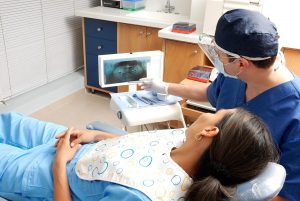Written by Chrystal Moulton, Staff Writer. The resveratrol group showed significant improvement in clinical attachment levels (CAL), bleeding index (BI), probing pocket depth (PPD), and oral hygiene index- simplified (OHI-S) compared to placebo [P < 0.01].
 Periodontal disease, or gum disease, is characterized by inflammation of the guns due to infection and can lead to tooth loss1. Chronic inflammation caused by periodontal disease can increase the risk for kidney disease, diabetes, and cardiovascular disease2. Studies have shown that resveratrol, which is commonly found in red wine, can improve symptoms of periodontal disease3-6. In the current trial researchers assess the effect of resveratrol on symptoms of periodontal disease7.
Periodontal disease, or gum disease, is characterized by inflammation of the guns due to infection and can lead to tooth loss1. Chronic inflammation caused by periodontal disease can increase the risk for kidney disease, diabetes, and cardiovascular disease2. Studies have shown that resveratrol, which is commonly found in red wine, can improve symptoms of periodontal disease3-6. In the current trial researchers assess the effect of resveratrol on symptoms of periodontal disease7.
Researchers recruited patients diagnosed with periodontitis who were over 18 years old. Study design was randomized double-blind placebo control. Patients are randomly divided into one of four groups: high dose resveratrol (500mg/d), mid-dose resveratrol (250mg/d), low dose resveratrol (125mg/d), or placebo. Treatments were administered orally over 8 weeks. Patients were not allowed other drug therapies during the investigation. Blood sample was collected to test for inflammatory markers, C- reactive protein levels, and fibrinogen. Safety and pharmacokinetics of resveratrol was also assessed (with a 24-hour pharmacokinetic study testing resveratrol presence in plasma over time). Primary outcomes were symptoms of periodontal disease assessed through bleeding index (BI), oral hygiene index- simplified (OHI-S), probing pocket depth (PPD), and clinical attachment level (CAL).
Of the 190 patients who voluntarily enrolled for this trial, 160 patients met the selection criteria and were randomly allocated to the four treatment groups.
- HRV (500 mg/d resveratrol): 40 patients
- MRV (250 mg/d resveratrol): 40 patients
- LRV (125 mg/d resveratrol): 40 patients
- Placebo: 40 patients
After eight weeks, patients within the resveratrol group showed significant improvement in clinical attachment levels (Cal), bleeding index (BI), probing pocket depth (PPD), and oral hygiene index- simplified (OHI-S) compared to placebo [P < 0.01]. Significant improvement in periodontal status was also observed in patients in the high dose and middle dose resveratrol treatment groups compared to low dose resveratrol treatment group [P <0.05]. Researchers also observed a significant reduction in serum levels of inflammatory markers (fibrinogen, IL-2, CRP, IL- 8, TNF alpha, IL-10, IL-12P40, GMCSF [granulocyte-macrophage colony stimulating factor]) in the resveratrol treatment groups compared to placebo [P <0.01]. No significant difference was observed between high dose and middle dose resveratrol treatment outcomes for inflammatory markers and periodontal status. There was a significant reduction in systemic endotoxin levels in patients assigned to the resveratrol treatment group compared to placebo (P< 0.01). Furthermore, patients in the high dose and middle dose resveratrol groups saw significant reduction in systemic endotoxin levels compared to those assigned low dose resveratrol (P <0.05). Pharmacokinetics showed that peak resveratrol concentration was achieved within 90 minutes, with a half-life of 842 minutes. No significant difference in adverse events was observed between the treatment and placebo. The most common adverse event experienced was nausea and diarrhea which was not significantly attributed to any of the treatment groups.
Overall treatment with resveratrol safely and effectively improved symptoms of periodontal disease in patients with aggressive periodontitis. Resveratrol treatment also improved serum levels of inflammatory markers and systemic levels of endotoxins. Further studies will be needed to verify these findings.
Source: Zhang, Qiang, Shuhan Xu, Wenxiu Xu, Yang Zhou, Hairong Luan, and Deli Wang. “Resveratrol decreases local inflammatory markers and systemic endotoxin in patients with aggressive periodontitis.” Medicine 101, no. 25 (2022): e29393-e29393.
© 2022 the Author(s). Published by Wolters Kluwer Health, Inc. This is an open access article distributed under the terms of the Creative Commons Attribution-Non Commercial License 4.0 (CCBY-NC), where it is permissible to download, share, remix, transform, and buildup the work provided it is properly cited. The work cannot be used commercially without permission from the journal.
Click here to read the full text study.
Posted October 26, 2022.
Chrystal Moulton BA, PMP, is a 2008 graduate of the University of Illinois at Chicago. She graduated with a bachelor’s in psychology with a focus on premedical studies and is a licensed project manager. She currently resides in Indianapolis, IN.
References:
- Pinto-Filho JM, Ribeiro LSF, Sartori L, Dos Santos JN, Ramalho LMP, Cury PR. Association between alcohol dependence and both periodontal disease and tooth loss: a cross-sectional study. Environmental science and pollution research international. Oct 2018;25(29):29089-29095. doi:10.1007/s11356-018-2807-3
- Tasdemir Z, Özsarı Tasdemir F, Gürgan C, Eroglu E, Gunturk I, Kocyigit I. The effect of periodontal disease treatment in patients with continuous ambulatory peritoneal dialysis. Int Urol Nephrol. Aug 2018;50(8):1519-1528. doi:10.1007/s11255-018-1913-y
- Andrade EF, Orlando DR, Araújo AMS, et al. Can Resveratrol Treatment Control the Progression of Induced Periodontal Disease? A Systematic Review and Meta-Analysis of Preclinical Studies. Nutrients. Apr 26 2019;11(5)doi:10.3390/nu11050953
- Kugaji MS, Kumbar VM, Peram MR, Patil S, Bhat KG, Diwan PV. Effect of Resveratrol on biofilm formation and virulence factor gene expression of Porphyromonas gingivalis in periodontal disease. Apmis. Apr 2019;127(4):187-195. doi:10.1111/apm.12930
- Chin YT, Cheng GY, Shih YJ, et al. Therapeutic applications of resveratrol and its derivatives on periodontitis. Ann N Y Acad Sci. Sep 2017;1403(1):101-108. doi:10.1111/nyas.13433
- Zare Javid A, Hormoznejad R, Yousefimanesh HA, et al. The Impact of Resveratrol Supplementation on Blood Glucose, Insulin, Insulin Resistance, Triglyceride, and Periodontal Markers in Type 2 Diabetic Patients with Chronic Periodontitis. Phytother Res. Jan 2017;31(1):108-114. doi:10.1002/ptr.5737
- Zhang Q, Xu S, Xu W, Zhou Y, Luan H, Wang D. Resveratrol decreases local inflammatory markers and systemic endotoxin in patients with aggressive periodontitis. Medicine (Baltimore). Jun 24 2022;101(25):e29393. doi:10.1097/md.0000000000029393
